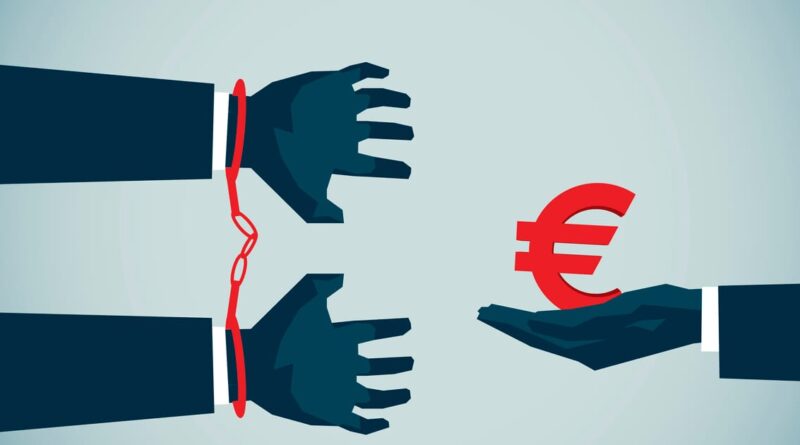Time for Ukraine to launch an anti-corruption counteroffensive
Press play to listen to this article
Voiced by artificial intelligence.
Josh Rudolph is the senior fellow and head of the malign finance and corruption team at the Alliance for Securing Democracy at the German Marshall Fund. Ambassador Norman Eisen is a senior fellow in governance studies at the Brookings Institute.
As Ukraine’s counteroffensive against Russian forces gets underway, the country’s allies must now help plot a separate counteroffensive — one that will be needed to beat another longtime nemesis of the Ukrainian people: oligarchs and grand corruption.
A small group of businessmen — many of whom became fabulously wealthy by manipulating the process of privatizing enormous companies previously owned by the Soviet state — often consolidated control over weak governments through political maneuvers like buying media conglomerates, bankrolling political parties, bribing judges, blackmailing prosecutors and underwriting vast networks of patronage, which extend from lawmakers and ministers in Kyiv to governors and bureaucrats throughout the country.
In today’s time of war, however, Ukraine’s oligarchs are weak — thanks, in large part, to public intolerance toward corruption, as well as current martial law restrictions against their media influence and industrial ownership. But corruption is both deep-set and endemic, and the country’s oligarchs will be back — potentially, just in time to try to reap vast profits from the hundreds of billions of dollars needed to rebuild Ukraine.
So, when Ukraine’s international donors gather in London next month for the sixth annual Ukraine Recovery Conference, they need to show Western taxpayers and businesses how exactly they plan to ensure transparency and accountability in the reconstruction process — otherwise, it won’t be funded on a scale worthy of the country’s war sacrifices.
For the United States, anti-corruption is key to further security and recovery aid for Ukraine. And for Europe, the continuation of Kyiv’s decade-long anti-corruption journey is the top requirement for its accession to the European Union, as most of the seven preconditions the country must meet in order to start negotiations relate to rule of law.
Meanwhile, for Ukraine itself, transparency and accountability are vital for ensuring money goes where it’s needed and to make good on the post-2014 social contract, which seeks to avoid seeding a new oligarchy, limit space for malign Kremlin influence and provide a level playing field to unlock investment.
And Ukraine is well equipped for this.
The country is only midway through a generational process of evolving from a Soviet oligarchy into a modern political-economic system. However, historians would be hard-pressed to find a precedent for the extent to which Ukraine has spent the past decade facing down such a menacing neighbor, while also persisting with a democratic transition to build transformative anti-corruption institutions.
Recognizing such feats, Ukraine’s reform innovations are being praised by the U.S. Agency for International Development as “revolutionary transparency tools,” including “the world’s first public beneficial ownership registry, the world’s most transparent public procurement system, the world’s first public database of politically exposed persons, and the world’s most comprehensive and well-enforced asset declaration system.”
Amid all this, it has also created the new international gold standard for a suite of specialized anti-corruption agencies that prevent, investigate, prosecute and rule on cases of grand corruption. And Kyiv restructured entire economic sectors previously exploited by oligarchs, such as energy, health, education, land, customs and finance.
However, this isn’t to say this mission is easy.
So far, gains have only been achieved through persistent international conditionality, which has regularly been interrupted by backsliding and political interference with anti-corruption agencies. The Ukrainian governance system also suffers from informal decision-making that favors powerful interest groups and tends to bypass democratic oversight. Meanwhile, power is concentrated in the office of the president, where some top appointees don’t care about reform. According to a prewar report, for example, costs for certain large state-funded construction projects were inflated by 30 percent, including a 10 percent kickback for officials.
Thus, Ukraine’s five anti-corruption bodies require additional resources and stronger authority, while further reforms are needed in key areas of government — from the judiciary to the security service — as well as oligarch-dominated sectors like media, construction and transport.
Nevertheless, the country’s progress in implementing reform demonstrates deep national commitment to combating corruption — key among Russian President Vladimir Putin’s motivations for attempting to decapitate Ukraine’s democratically elected leadership.
In a speech just three days prior to the invasion, Putin named several of Ukraine’s anti-corruption institutions and vented his grievances regarding the country’s leadership selection and foreign support, betraying his meticulous knowledge of and bitter resentment toward these measures. Putin fears Ukrainian transparency and accountability reforms, as they close pathways for the Kremlin’s covert influence, strengthen Ukrainian defensive capabilities, prepare the country for Euro-Atlantic integration and risk inspiring his perceived subjects — whether in Russia or other former Soviet states — to overthrow thieving despots like him.
The current war thus represents a struggle that is emblematic of modern geopolitical competition. Corruption has replaced communist ideology as the glue that binds the inner circles of authoritarian challengers to the rules-based international order, as well as the vector through which these regimes export their closed systems and subvert the sovereignty of democracies.
Thus, countering corruption through transparency and accountability is a strategic imperative that must be integrated into a modern Marshall Plan for Ukraine — much like how containing Communism was integrated into the original Marshall Plan.
And this will require a global effort.
While oligarchy represents the rule of the few, democracy is the rule of the many. And if the latter is to win this struggle between governance models, Ukraine’s allies must draw upon the breadth of democracy by integrating the deep well of societal stakeholders, robust institutions and experienced professionals, which have supported Ukrainian reforms over the past decade, into its donor coordination.
Next month’s conference in London will be a key moment to chart this territory. And our new research recommends concrete commitments that donors could pledge to elevate transparency and accountability reform as a strategic imperative: prioritizing anti-corruption conditions, using Ukraine’s new transparency tools, forming a Ukrainian civil society board to advise donors, empowering local governments and creating a fusion cell of auditors in Kyiv.
This is the battle plan — the attack vectors and foot soldiers of a counteroffensive against old and new oligarchy and grand corruption in the recovery and reconstruction of Ukraine. And all of it will be needed to secure the freedom, independence and prosperity for which Ukrainians are fighting.




